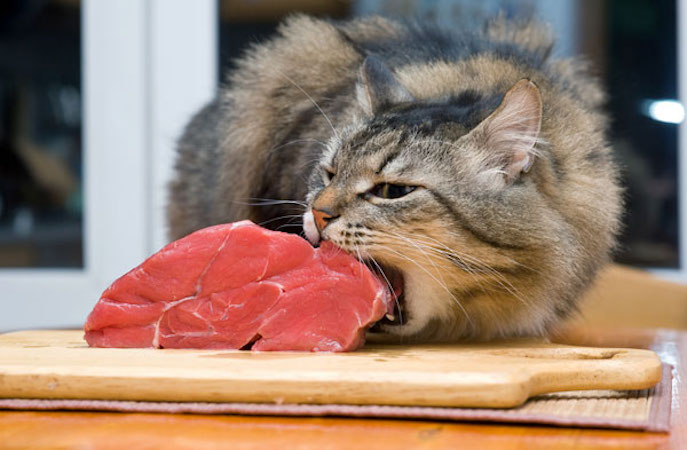Dictionary definitions
Cat: A small carnivorous mammal (Felis catus or F. domesticus).
Carnivore: A flesh-eating animal.
Obligate carnivore: An animal that, by its genetic makeup, must eat the tissue of other animals in order to thrive. The domestic cat is a prime example of an obligate carnivore, as are all of the other felines.
Cats are Carnivores
Clearly, cats are obligate carnivores – but what does that really mean when it comes to feeding them? Meat is the obvious answer because the food we feed our cats is responsible for the overall health of our furry friends.
But how do we know for sure what we are feeding is actually appropriate for a feline? Most of us haven’t given a second thought about what is actually in the canned or dry kibble we feed our cats. We assume because of life stage claims on the packaging, the food we’re feeding is species appropriate. But more often than not it isn’t the case.
 By looking at the ingredients listed on pet food labels, we can easily determine if the food is species appropriate. The first two or three items on the ingredient list form the major part of the food. Canned foods are primarily based on meat and meat by-products, while dry kibble contains ingredients made of plant matter (corn, wheat, soy, vegetables, fruits, etc) which is then sprayed with substances to make the kibble more appealing to our cats. Without sprayed flavorings, most cats would not find dry kibble appealing.
By looking at the ingredients listed on pet food labels, we can easily determine if the food is species appropriate. The first two or three items on the ingredient list form the major part of the food. Canned foods are primarily based on meat and meat by-products, while dry kibble contains ingredients made of plant matter (corn, wheat, soy, vegetables, fruits, etc) which is then sprayed with substances to make the kibble more appealing to our cats. Without sprayed flavorings, most cats would not find dry kibble appealing.
Reasons to feed our cats meat instead of dry kibble
- The protein derived from meat has the complete amino acid profile that our felines require for good health, while protein derived from plant matter does not. The proteins from meat are far superior to those from plant matter, and meet the physiological requirements of our obligate carnivores.
- The carbohydrate content of dry kibble is far too high. Cats only require about 5% carbs in their overall diet, and dry cat food contains 30 to 50%. A diet high in carbohydrates is a recipe for poor health for our cats. It has been shown that a high carbohydrate diet contributes heavily to Feline Diabetes (FD). Many cats with FD will even stop needing insulin when dry food is removed from their diet. Feeding your cat dry food is the equivalent of raising your children on donuts and candy.
- Dry food is dry! Because the household cat originates in arid, desert climates, cats are not naturally big water drinkers. They are designed to get the moisture their bodies require from the food they eat. Even if your cat drinks a lot of water, if it is on a dry food diet, it is not getting the moisture it needs, keeping the cat in a constant state of low level dehydration. This shows up in a poor hair coat, with dandruff, and more importantly, will eventually impact the kidneys.
- There is strong evidence linking a dry food diet to a number of feline health problems: Diabetes, Kidney Disease, Inflammatory Bowel Disease, Cystitis, Bladder/Kidney stones and other urinary tract problems, Obesity, Dental Disease, Feline Asthma, and Hepatic Lipidosis. How much healthier our cats would be if fed the correct diet!
- The two most common ingredients used in making dry kibble cat food are corn and wheat – and these two items are also at the very top of the list of known allergens for cats.
So, what to feed your cat?
Most any canned food will do, with a caveat – no grains! Learn to read labels, and look for foods with no corn, wheat, soy, or glutens. Usually, foods with gravy contain corn starch, and are not a good choice. Learn to calculate the dry matter carbs in your cat’s food, and stay with foods that are 10% carbs or less.
Also remember that two of the leading allergens for cats are beef and fish – neither is a natural food for cats. If your cat can eat these flavors with no problem, fine. Fish, however, should be kept to once or twice a week, as there are a number of reasons it is not good for cats.
If your cat has Feline Diabetes, we can help you understand the huge role food plays in that disease, as well as help you work toward getting your cat into remission. As a part of the continuing education we offer our members, there is a great deal more information on the Diabetic Cat Help Forum, including already compiled lists of appropriate canned cat food, tips and tricks to use for transitioning off of dry food, a list of appropriate, low carb treats, and a carbohydrate calculator. We have recipes for food to feed your sick cat, and information on syringe feeding. There is also information on raw food, with vet approved recipes for making your own, if you are interested in doing that. Information on the forum is supported by veterinary evidence. Even if your cat is not a diabetic, we urge you to join the Forum so you can benefit from the wealth of dietary information posted there.